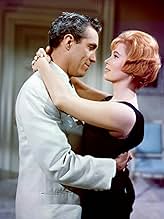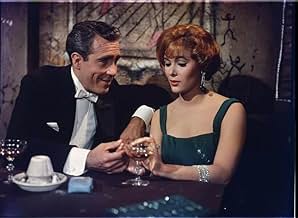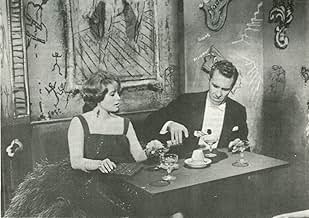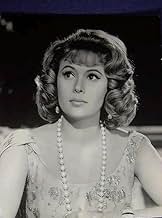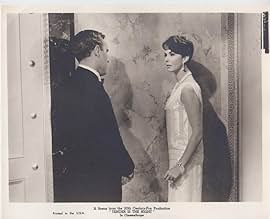Ajouter une intrigue dans votre langueA Psychiatrist and his life with a patient he helped to recover.A Psychiatrist and his life with a patient he helped to recover.A Psychiatrist and his life with a patient he helped to recover.
- Réalisation
- Scénario
- Casting principal
- Nommé pour 1 Oscar
- 1 victoire et 1 nomination au total
Jason Robards
- Dr. Richard 'Dick' Diver
- (as Jason Robards Jr.)
Avis à la une
"Tender is the Night" seemed to be the sort of film Jennifer Jones should not have been making at that time in her career. She was a woman who had emotional problems that seemed uncomfortably close to the problems her character in the film experienced.
The film is based on what is considered F. Scott Fitzgerald's most autobiographical novel. According to some sources, Jennifer Jones' character, Nicole Diver, was based on Fitzgerald's marriage to a highly-strung woman who suffered from severe psychological disorders.
Like Hemingway's "The Sun Also Rises", the film is set among expatriate Americans in Europe in the 1920's. Nicole (Jennifer Jones) is married to psychiatrist Dick Diver (Jason Robards). They are financially well off and their life revolves around serious partying. They even have a resident, alcoholic, piano playing composer, Abe North, played by Tom Ewell, who is frustrated at having a great melody stuck in his system.
We learn through flashback that Nicole had been Dick's patient and there is concern that she may not really be cured and that Dick himself may have issues. Infidelity lurks in every corner, especially when a young starlet takes a fancy to Dick. Eventually Nicole and Dick drift apart as Dick heads deeper into alcoholism (as did Fitzgerald).
Jennifer Jones still exuded that amazing aura and fits the part well; too well if one is aware of her story.
Cary Grant was considered for the part of Dick Diver, but it finally went to Jason Robards. Although he was a brilliant stage and character actor, Robards didn't project the charisma of a Cary Grant, and maybe that's what was needed.
Although the final scenes do pack a punch, for the most part the film seems dry and talky.
There is location work in Switzerland and France with brilliant scenes at the end shot on the French Riviera, but much of the interior studio work is flat and uninspired. Also, Bernard Herrmann's score doesn't marry with the fabric of the film the way his scores did for "Vertigo", "North By Northwest" and many others.
The actors are photographed mainly at the middle distance with few close-ups. Possibly Selznick forbade closing in on Jennifer Jones who was about 43 at the time. She looked fabulous though with a tightly bobbed hairstyle.
Big and glossy, the film is interesting more for the behind-the-scenes story, but for Jennifer Jones fans, she is still a good reason to seek it out.
The film is based on what is considered F. Scott Fitzgerald's most autobiographical novel. According to some sources, Jennifer Jones' character, Nicole Diver, was based on Fitzgerald's marriage to a highly-strung woman who suffered from severe psychological disorders.
Like Hemingway's "The Sun Also Rises", the film is set among expatriate Americans in Europe in the 1920's. Nicole (Jennifer Jones) is married to psychiatrist Dick Diver (Jason Robards). They are financially well off and their life revolves around serious partying. They even have a resident, alcoholic, piano playing composer, Abe North, played by Tom Ewell, who is frustrated at having a great melody stuck in his system.
We learn through flashback that Nicole had been Dick's patient and there is concern that she may not really be cured and that Dick himself may have issues. Infidelity lurks in every corner, especially when a young starlet takes a fancy to Dick. Eventually Nicole and Dick drift apart as Dick heads deeper into alcoholism (as did Fitzgerald).
Jennifer Jones still exuded that amazing aura and fits the part well; too well if one is aware of her story.
Cary Grant was considered for the part of Dick Diver, but it finally went to Jason Robards. Although he was a brilliant stage and character actor, Robards didn't project the charisma of a Cary Grant, and maybe that's what was needed.
Although the final scenes do pack a punch, for the most part the film seems dry and talky.
There is location work in Switzerland and France with brilliant scenes at the end shot on the French Riviera, but much of the interior studio work is flat and uninspired. Also, Bernard Herrmann's score doesn't marry with the fabric of the film the way his scores did for "Vertigo", "North By Northwest" and many others.
The actors are photographed mainly at the middle distance with few close-ups. Possibly Selznick forbade closing in on Jennifer Jones who was about 43 at the time. She looked fabulous though with a tightly bobbed hairstyle.
Big and glossy, the film is interesting more for the behind-the-scenes story, but for Jennifer Jones fans, she is still a good reason to seek it out.
and stilted about this film, and its casting.
Jason Robards who always delivers, just seems wooden and ineffectual as Dick Diver. Jennifer Jones as the ever desirable, but tragic Nicole Diver, just seems unsympathetic, even strident and cruel.
The alcohol flows freely and the jet-set lifestyle is invoked by a humorous Tom Ewell, who sings the movies theme song at the beginning of this disjointed movie. (Tom Ewell is forever planted in my memory as Marilyn Monroes bumbling neighbor in "The Seven Year Itch", or as the silly, clichéd father in "State Fair") That being said, it almost seems as if the writers did not know how to treat the subject of psychoanalysis and mental illness. F Scott Fitgerald and his wife endured tragedy, his wife Zelda Sayre Fitgerald was diagnosed with schizophrenia while still in her 20's. She was delusional at times, and probably never walked around at all times looking like a John Robert Powers model,(as Jones does in this movie).
It was 1962 after all, psychoanalysis was chic and stylish, so this film presents the illness as stylish and merely the effect of being rich and bored on the French Riviera. I wanted to like this film, but it is sorely dated and due for a remake. If nothing else it aptly demonstrates society stigma and misconceptions when portraying mental illness. No wonder there is still so much denial, if this film was considered an acceptable story of a physician and his wife in 1962. Worth seeing as a curiosity. 5/10.
Jason Robards who always delivers, just seems wooden and ineffectual as Dick Diver. Jennifer Jones as the ever desirable, but tragic Nicole Diver, just seems unsympathetic, even strident and cruel.
The alcohol flows freely and the jet-set lifestyle is invoked by a humorous Tom Ewell, who sings the movies theme song at the beginning of this disjointed movie. (Tom Ewell is forever planted in my memory as Marilyn Monroes bumbling neighbor in "The Seven Year Itch", or as the silly, clichéd father in "State Fair") That being said, it almost seems as if the writers did not know how to treat the subject of psychoanalysis and mental illness. F Scott Fitgerald and his wife endured tragedy, his wife Zelda Sayre Fitgerald was diagnosed with schizophrenia while still in her 20's. She was delusional at times, and probably never walked around at all times looking like a John Robert Powers model,(as Jones does in this movie).
It was 1962 after all, psychoanalysis was chic and stylish, so this film presents the illness as stylish and merely the effect of being rich and bored on the French Riviera. I wanted to like this film, but it is sorely dated and due for a remake. If nothing else it aptly demonstrates society stigma and misconceptions when portraying mental illness. No wonder there is still so much denial, if this film was considered an acceptable story of a physician and his wife in 1962. Worth seeing as a curiosity. 5/10.
Well, c'est la vie.
A wonderful cast and beautiful scenery are the highlights of "Tender is the Night," a 1962 film starring Jason Robards, Jennifer Jones, Tom Ewell, Joan Fonaine, Jill St. John, and Paul Lukas. The film is based on a book by F. Scott Fitzgerald.
Fitzgerald wrote beautiful prose, but much of his work has been difficult to adapt to the screen. He himself worked as a writer in Hollywood but wound up uncredited on most of the scripts and told someone that he did recognize one of his lines in a film that evidently had not been cut from a script.
In this film, Robards plays Dick Driver, a psychiatrist who falls for one of his patients, Nicole (Jones). Nicole is being treated for mental instability, the result of incest (though this is only hinted at). When Dick realizes his feelings, and hers, he quickly distances himself, but she runs into him after she leaves the sanitarium and the two wind up getting married.
Nicole is filthy rich, and the money is controlled by her sister (Joan Fontaine). Dick gets lulled into the good life, the parties, the travel, the luxury, and while he intends to return to his work at the sanitarium and finish a book, he doesn't go. This is mainly because the insecure and sometimes paranoid Nicole is resistant. When he finally returns to the sanitarium, his mentor (Lukas) is dying and the sanitarium has been taken over by a colleague, who only wants Driver's investment. Driver refuses, since he would have to get the money from Nicole, but she insists. But for Driver, it feels like it's all too late.
The acting is superb and Jones, one of my favorites, looks gorgeous throughout. She is somewhat nervous and mannered as Nicole, but that's the character, and she captures her. Robards is strong, emotional, and excellent as the deeply convicted Driver. And how wonderful to see Paul Lukas. I actually recognized his voice and then looked at his face -- I'm so used to seeing him in movies made 20 years earlier that I didn't recognize him at first.
The problem with the film for me is that so much that goes on is beneath the surface -- this can be a fascinating feature, but it is directed at too leisurely a pace by Henry King. The St. John character is never really fleshed out, she darts in and out of the picture; ditto the drunken composer played by Tom Ewell. We just don't know enough about him to care. Joan Fontaine wears some great clothes and acts well, and we do get to know her somewhat.
The other problem is the time in which it is set, which seems a bit generic. It's supposed to be the '20s - I can tell by the music - but not by anything else. The ambiance is '60s.
Nevertheless, Tender is the Night was an ambitious project that probably could have used some judicious editing, but if you're a Jones fan you won't want to miss it.
A wonderful cast and beautiful scenery are the highlights of "Tender is the Night," a 1962 film starring Jason Robards, Jennifer Jones, Tom Ewell, Joan Fonaine, Jill St. John, and Paul Lukas. The film is based on a book by F. Scott Fitzgerald.
Fitzgerald wrote beautiful prose, but much of his work has been difficult to adapt to the screen. He himself worked as a writer in Hollywood but wound up uncredited on most of the scripts and told someone that he did recognize one of his lines in a film that evidently had not been cut from a script.
In this film, Robards plays Dick Driver, a psychiatrist who falls for one of his patients, Nicole (Jones). Nicole is being treated for mental instability, the result of incest (though this is only hinted at). When Dick realizes his feelings, and hers, he quickly distances himself, but she runs into him after she leaves the sanitarium and the two wind up getting married.
Nicole is filthy rich, and the money is controlled by her sister (Joan Fontaine). Dick gets lulled into the good life, the parties, the travel, the luxury, and while he intends to return to his work at the sanitarium and finish a book, he doesn't go. This is mainly because the insecure and sometimes paranoid Nicole is resistant. When he finally returns to the sanitarium, his mentor (Lukas) is dying and the sanitarium has been taken over by a colleague, who only wants Driver's investment. Driver refuses, since he would have to get the money from Nicole, but she insists. But for Driver, it feels like it's all too late.
The acting is superb and Jones, one of my favorites, looks gorgeous throughout. She is somewhat nervous and mannered as Nicole, but that's the character, and she captures her. Robards is strong, emotional, and excellent as the deeply convicted Driver. And how wonderful to see Paul Lukas. I actually recognized his voice and then looked at his face -- I'm so used to seeing him in movies made 20 years earlier that I didn't recognize him at first.
The problem with the film for me is that so much that goes on is beneath the surface -- this can be a fascinating feature, but it is directed at too leisurely a pace by Henry King. The St. John character is never really fleshed out, she darts in and out of the picture; ditto the drunken composer played by Tom Ewell. We just don't know enough about him to care. Joan Fontaine wears some great clothes and acts well, and we do get to know her somewhat.
The other problem is the time in which it is set, which seems a bit generic. It's supposed to be the '20s - I can tell by the music - but not by anything else. The ambiance is '60s.
Nevertheless, Tender is the Night was an ambitious project that probably could have used some judicious editing, but if you're a Jones fan you won't want to miss it.
When this was released I managed to see most films first-run, except the ones clearly aimed at my age group. (Such a snob, n'est-ce pas?!?) So, being a fan of both Jennifer and Joan, I went to a Los Angeles-area theater with top-notch projection and sound. Back then Twentieth-Century Fox rarely stinted on sending companies to the actual locales of the stories being filmed, so this one has plenty of its share of gorgeous shots set in Switzerland and elsewhere on the Continent, as I recall.
But, as other comments herein attest, the rest is somewhat of a disappointment. Henry King, the director, seemed to encourage Jennifer Jones in some of her less-attractive mannerisms which somehow were not so apt as a rendition of her character's mental distress. Jason Robards, Jr. was never much of a success as a romantic lead, in my opinion. And Joan Fontaine was assigned the rather thankless role of a rich "bitch." All in all it's a prime example of how the studio "system" was growing out of touch with an ever-younger movie audience. Nevertheless for those of us who have always appreciated luxurious eye candy, it was a fairly tasty treat.
But, as other comments herein attest, the rest is somewhat of a disappointment. Henry King, the director, seemed to encourage Jennifer Jones in some of her less-attractive mannerisms which somehow were not so apt as a rendition of her character's mental distress. Jason Robards, Jr. was never much of a success as a romantic lead, in my opinion. And Joan Fontaine was assigned the rather thankless role of a rich "bitch." All in all it's a prime example of how the studio "system" was growing out of touch with an ever-younger movie audience. Nevertheless for those of us who have always appreciated luxurious eye candy, it was a fairly tasty treat.
The great 20th century American novelists all created books that were difficult to transfer to the big screen successfully. Hollywood had better luck adapting the short stories of Faulkner and Hemingway to the motion picture medium than with their master works. Fitzgerald was no exception. None of his masterpieces was a total success when rewritten as screenplays, even when directed by such skilled artisans as Henry King. Only John Steinbeck's works were ready-made for media exchanges. But who would place him on the same creative sphere as Faulkner, Hemingway, and Fitzgerald? "Tender is the Night" has its moments of greatness, in particular toward the end and who can fault the acting of such a stellar cast.
One distraction for this viewer was the failure of the director and cinematographer to capture on film the essence of The Jazz Age the way Fitzgerald did in his novel. This version of "Tender is the Night" has the 1960's written all over it from the clothes worn to a jet-set aura rather than the Lost Generation expatriate ambiance of the Fitzgerald masterpiece. Even the music is more 1930's swing than 1920's jazz. The only saving grace in the music department is the original score provided by virtuoso composer Bernard Herrmann.
All that remains of Fitzgerald is the bare bones story of the cosmopolitan Divers, focusing on Dr. Dick Diver, played with élan by Jason Robards Jr, a psychiatrist, married to Nicole (Jennifer Jones), who has suffered a mental breakdown. The good doctor becomes both a husband and an analyst to his mentally unbalanced spouse. On the French Riviera just before the stock market crash of 1929, Dr. Diver, near middle age, meets and falls for a rising starlet, Rosemary Hoyt (Jill St. John). As the plot thickens, Dr. Diver slides into a maelstrom of drunken escapades until he hits rock bottom. The story somewhat parallels Fitzgerald and his wife Zelda's own experiences, though Fitzgerald claimed it was based on friends Gerald and Sara Murphy's struggles.
By all means read the novel before watching this screen adaptation. I recommend the film only as a supplement to the book, perhaps Fitzgerald's best work.
One distraction for this viewer was the failure of the director and cinematographer to capture on film the essence of The Jazz Age the way Fitzgerald did in his novel. This version of "Tender is the Night" has the 1960's written all over it from the clothes worn to a jet-set aura rather than the Lost Generation expatriate ambiance of the Fitzgerald masterpiece. Even the music is more 1930's swing than 1920's jazz. The only saving grace in the music department is the original score provided by virtuoso composer Bernard Herrmann.
All that remains of Fitzgerald is the bare bones story of the cosmopolitan Divers, focusing on Dr. Dick Diver, played with élan by Jason Robards Jr, a psychiatrist, married to Nicole (Jennifer Jones), who has suffered a mental breakdown. The good doctor becomes both a husband and an analyst to his mentally unbalanced spouse. On the French Riviera just before the stock market crash of 1929, Dr. Diver, near middle age, meets and falls for a rising starlet, Rosemary Hoyt (Jill St. John). As the plot thickens, Dr. Diver slides into a maelstrom of drunken escapades until he hits rock bottom. The story somewhat parallels Fitzgerald and his wife Zelda's own experiences, though Fitzgerald claimed it was based on friends Gerald and Sara Murphy's struggles.
By all means read the novel before watching this screen adaptation. I recommend the film only as a supplement to the book, perhaps Fitzgerald's best work.
Le saviez-vous
- AnecdotesThe Divers are based on real-life couple Gerald and Sara Murphy, friends and patrons of the famous, including the author of this story, F. Scott Fitzgerald. Poet Archibald Macleish once said of the Murphys that "there was a shine to life wherever they were".
- GaffesThe American flag adorning the child's sand castle has its stars arranged in the staggered rows of 5 and 6 stars as in the current 50 stars arrangement. An American flag of the 1920's would have had its stars in the 6 rows of 8 arrangement.
- Citations
Mr. Albert Charles McKisco: What's your place in the economy of life, Barban?
Tommy Barban: I shoot
Mr. Albert Charles McKisco: Just any old thing, huh?
Tommy Barban: Well, er... buffalo in Africa, tigers in India, Bolsheviks in Europe...
Mr. Albert Charles McKisco: Don't you ever get the urge to do anything?
Tommy Barban: Yes. I would like to restore the Holy Roman Empire.
- ConnexionsFeatured in 20th Century-Fox: The First 50 Years (1997)
- Bandes originalesTender Is the Night
Music by Sammy Fain
Lyrics by Paul Francis Webster
Sung by an off-screen vocal group during the opening credits
Meilleurs choix
Connectez-vous pour évaluer et suivre la liste de favoris afin de recevoir des recommandations personnalisées
- How long is Tender Is the Night?Alimenté par Alexa
Détails
Box-office
- Budget
- 3 900 000 $US (estimé)
- Durée2 heures 22 minutes
- Couleur
- Rapport de forme
- 2.35 : 1
Contribuer à cette page
Suggérer une modification ou ajouter du contenu manquant

Lacune principale
By what name was Tendre est la nuit (1962) officially released in India in English?
Répondre



